#CRM Software CRM Solutions Customer Relationship Management Business Management Software Sales Improvement CRM
Text
Top Rated CRM Software, Sales Improvement CRM Solution | SalezRobot CRM
#CRM Software#CRM Solution#Top Rated CRM Software#Sales Improvement CRM Software#Customer Relationship Management Software#Business Management Software#CRM for All Business CRM Software#CRM for All Business
0 notes
Text
Harnessing CRM Analytics for Business Growth
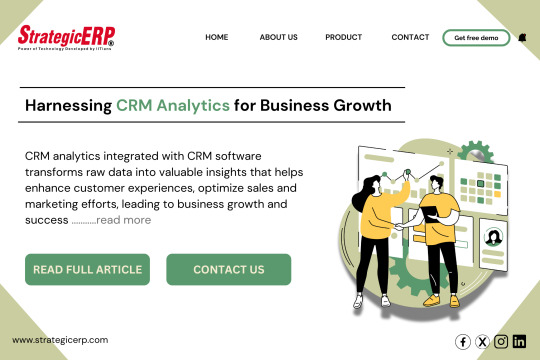
Advanced analytics powered by Artificial Intelligence provides invaluable insights to any business. Integration with AI elevates the reporting capabilities of a Customer Relationship Management system. Fetching data from various points of contact results in forming comprehensive client profiles, which when analyzed provide accurate insights.
Built-in AI features allow the system to generate predictive insights about customer payments, unit bookings, site visits and more. Delivering cutting-edge solutions and insights to its clients is the realm of customer relationship management (CRM) software.
It generally consists of a comprehensive suite of services designed to help businesses leverage the full potential of their data, making data-driven decisions, identifying actionable insights, and driving more personalized customer experiences. CRM Analytics offers a range of services, providing unparalleled value through:
Data Collection
Data Analysis
Reporting
Dashboard Development
Data Visualization
Predictive Analytics
Custom reporting
Data integration
Data is the lifeblood of any business, and the goal of CRM software should be to empower clients with the tools and expertise they need to harness the power of their data for business growth and success. These insights empower companies to make informed decisions, tailor their marketing strategies, enhance customer experiences, and ultimately drive business growth.
Data-Driven Decision Making: CRM analytics transforms raw customer data into actionable insights. Businesses can use these insights to make informed decisions about product offerings, marketing campaigns, sales strategies, and customer service improvements.
Customer Understanding: By analyzing customer interactions, purchase histories, and engagement patterns, businesses can gain a deep understanding of their customers. This understanding helps in segmenting customers, identifying their needs, and tailoring products and services to better serve them.
Personalized Marketing: It enables businesses to create personalized marketing campaigns. By knowing individual preferences, purchase histories, and browsing behaviors, companies can deliver targeted and relevant messages to customers, increasing the chances of conversion.
Sales Performance Improvement: CRM analytics provides sales teams with data on lead conversions, sales cycles, and customer buying patterns. This information can help identify areas for improvement, optimize sales processes, and allocate resources more effectively.
Customer Retention and Loyalty: Understanding customer behaviors and preferences allows businesses to proactively address issues, offer personalized solutions, and foster customer loyalty. Satisfied customers are more likely to remain loyal and recommend the company to others.
Forecasting and Planning: CRM analytics can provide insights into future trends and demands by analyzing historical data. This helps businesses forecast sales, plan inventory levels, and allocate resources appropriately.
Identifying Cross-Selling and Upselling Opportunities: By analyzing customer purchasing patterns, businesses can identify opportunities for cross-selling or upselling additional products or services, increasing revenue per customer.
Monitoring Marketing Campaign Effectiveness: CRM analytics helps evaluate the success of marketing campaigns by tracking metrics such as click-through rates, conversion rates, and customer engagement. This allows for real-time adjustments and optimizations.
Improving Customer Service: By analyzing customer service interactions and feedback, businesses can identify common issues and areas for improvement. This leads to better service quality and enhanced customer satisfaction.
Competitive Advantage: Companies that effectively use CRM analytics gain a competitive edge by making data-driven decisions that are aligned with customer needs and market trends.
CRM analytics becomes an essential part of the software. It enables businesses to gain valuable insights into customer behaviors, preferences, and interactions.
2 notes
·
View notes
Text
CRM Software In UAE

Looking for a reliable CRM software solution to manage your customer relationships effectively? TradersFind is your one-stop destination to discover top CRM software providers in UAE.
Our platform connects buyers with leading CRM software companies, offering a range of solutions to meet your business needs. Whether you're a small startup or a large enterprise, our directory features providers with solutions tailored to your requirements.
Benefits of Choosing CRM Software from TradersFind:
Enhanced Customer Relationships: Improve customer engagement and satisfaction with personalized interactions and timely follow-ups.
Increased Efficiency: Streamline your sales, marketing, and customer service processes with a centralized CRM system.
Data Security: Ensure the safety and confidentiality of your customer data with secure CRM software solutions.
Scalability: Choose from scalable CRM solutions that can grow with your business, adapting to your evolving needs.
Analytics and Reporting: Gain valuable insights into your customer behavior and business performance with advanced analytics tools.
Connect with us on WhatsApp at +971 56 977 3623 to explore the best CRM software options for your business and find the perfect provider to meet your needs.
Visit TradersFind today and discover a wide range of CRM software providers in the UAE. Experience the convenience of finding the right CRM solution for your business, all in one platform.
Visit -https://www.tradersfind.com/category/crm-software
#crm#datacenter#softwares#business#CRMSoftware#CustomerRelationshipManagement#BusinessEfficiency#DataSecurity#ScalableSolutions#Analytics#TradersFind#B2B#UAE#Dubai#AbuDhabi#Sharjah#Ajman#RasAlKhaimah
3 notes
·
View notes
Text
Why Manufacturers Grow Faster With ERP Software
Introduction:
In the ever-evolving landscape of manufacturing, staying ahead of the competition requires more than just producing quality products. It demands efficient processes, streamlined operations, and the ability to adapt to changing market dynamics. This is where ERP (Enterprise Resource Planning) software steps in as a game-changer for manufacturers. In this blog, we'll delve into the reasons why manufacturers experience accelerated growth with ERP software and explore the significance of key ERP modules designed for the manufacturing industry. Let's unlock the potential of the best manufacturing ERP software and understand how it propels growth.
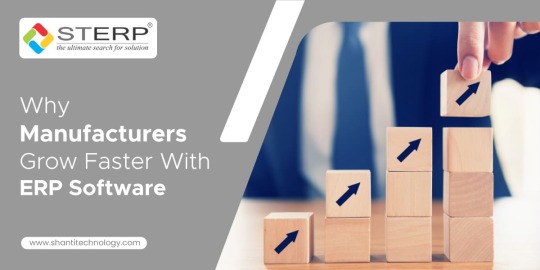
Understanding ERP Modules for Manufacturing Industry:
1. Supply Chain Management:
Effective supply chain management is at the core of manufacturing success. ERP modules for manufacturing industry streamline supply chain processes by providing real-time visibility into inventory levels, order status, and supplier relationships. Manufacturers can optimize procurement, reduce lead times, and enhance overall supply chain efficiency.
2. Production Planning and Scheduling:
Efficient production planning and scheduling are essential for meeting customer demands and minimizing downtime. ERP software enables manufacturers to create realistic production schedules, allocate resources effectively, and adjust plans dynamically in response to changing demand. This results in improved production efficiency and timely delivery of products.
3. Quality Control:
Maintaining consistent product quality is a non-negotiable aspect of manufacturing. ERP modules for quality control allow manufacturers to monitor production processes in real-time, track defects, and enforce adherence to quality standards. This not only ensures the delivery of high-quality products but also reduces waste and rework costs.
4. Inventory Management:
Managing inventory effectively is a delicate balancing act. ERP software provides manufacturers with tools to optimize inventory levels, track stock movements, and minimize carrying costs. With real-time insights into inventory status, manufacturers can prevent stockouts, reduce excess inventory, and enhance overall supply chain efficiency.
Manufacturing Enterprise Resource Planning Software: Unleashing Growth Potential
1. Streamlined Communication:
Effective communication is crucial for seamless operations. Manufacturing ERP software centralizes communication channels, allowing different departments to share information in real-time. This not only reduces the risk of miscommunication but also fosters collaboration among teams, leading to improved overall efficiency.
2. Data-Driven Decision-Making:
In the fast-paced world of manufacturing, decisions need to be swift and well-informed. ERP software aggregates data from various business processes, providing manufacturers with actionable insights. Data-driven decision-making becomes a reality, enabling manufacturers to respond proactively to market trends, customer demands, and operational challenges.
3. Scalability for Growth:
Growth is a constant objective for manufacturers. The best ERP for the manufacturing industry is designed with scalability in mind. As businesses expand, ERP systems can easily accommodate increased data volume, users, and additional functionalities. This scalability ensures that the ERP solution grows with the manufacturing enterprise, supporting its evolving needs.
4. Enhanced Customer Relationship Management (CRM):
Customer satisfaction is a key driver of growth. Manufacturing ERP software often includes CRM modules that allow manufacturers to manage customer relationships effectively. From order processing to after-sales support, ERP systems help manufacturers deliver exceptional customer experiences, fostering customer loyalty and driving growth.
Best ERP for Manufacturing Industry: Navigating Toward Success
1. Tailored Solutions for Industry Needs:
The best ERP for the manufacturing industry goes beyond generic solutions. It offers modules specifically designed to address the unique challenges and requirements of manufacturing operations. From managing complex bills of materials to handling production workflows, the best ERP software is tailored to the intricacies of the manufacturing sector.
2. Real-Time Reporting and Analytics:
Timely and accurate reporting is a cornerstone of effective decision-making. The best manufacturing ERP software provides robust reporting and analytics capabilities, allowing manufacturers to generate custom reports, track key performance indicators (KPIs), and gain insights into operational efficiency. This empowers manufacturers to identify areas for improvement and implement strategic changes.
3. Compliance and Regulatory Support:
Compliance with industry regulations is non-negotiable for manufacturers. The best ERP solutions for manufacturing industry include features that help businesses adhere to regulatory requirements. This not only ensures legal compliance but also mitigates the risk of penalties and reputational damage.
4. User-Friendly Interfaces:
User adoption is critical for the success of any ERP implementation. The best ERP modules for manufacturing industry prioritize user-friendly interfaces, making it easier for employees to navigate the system and perform their tasks. Intuitive interfaces contribute to smoother onboarding processes and overall system usability.
Conclusion:
In the fast-paced world of manufacturing, growth is not just a goal; it's a necessity. ERP software emerges as a strategic ally for manufacturers, propelling them toward accelerated growth by optimizing processes, fostering efficiency, and enabling informed decision-making. From the essential ERP modules for the manufacturing industry to the features that make the best ERP solutions stand out, manufacturers can unlock their full growth potential with the right ERP software. Embrace the power of ERP, and witness your manufacturing enterprise soar to new heights of success.
#ERP Modules for Manufacturing Industry#Manufacturing Enterprise Resource Planning Software#Best Manufacturing ERP Software#Best ERP for Manufacturing Industry#ERP Software for Manufacturing Industry#ERP System for Manufacturing Industry#ERP for Software Development Company#ERP Solutions for Manufacturing#India
6 notes
·
View notes
Text
Navigating the World of Travel CRMs for the Travel Industry
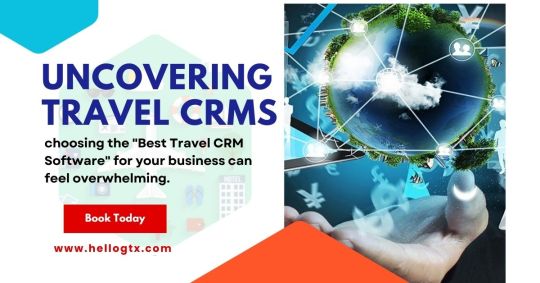
Introduction:
Achievement in the constantly shifting travel industry depends logically on productivity and management. The importance of Travel CRM Software develops as tour operators and travel agencies strive to provide their customers with extraordinary experiences. We will simplify the complexities of travel CRMs in this extended work, providing tour operators and travel agencies with everything they need to succeed in 2024 and beyond.
What is a Travel CRM?
A Travel CRM, or Customer Relationship Management software, is a powerful tool designed to streamline and optimize various aspects of a travel business. From managing customer interactions and bookings to tracking sales and analyzing data, Travel CRMs play a central role in enhancing operational efficiency and customer satisfaction.
Benefits of Using Travel CRM Software:
Centralized Data Management: Keep all customer information, bookings, and interactions organized and easily accessible.
Enhanced Customer Relationships: Build stronger connections with clients by personalizing communication and delivering tailored experiences.
Improved Sales and Marketing: Identify opportunities, track leads, and execute targeted marketing campaigns to drive sales and revenue.
Streamlined Operations: Automate repetitive tasks, streamline workflows, and optimize resource allocation to increase productivity.
Data-driven Insights: Gain valuable insights into customer behavior, market trends, and business performance to make informed decisions and strategies.
Choosing the Best Travel CRM Software:
When selecting a Travel CRM software, it's essential to consider factors such as features, scalability, integrations, pricing, and customer support. Look for solutions that offer robust functionalities tailored to the needs of tour operators and travel agents, along with user-friendly interfaces and reliable support services.
Integrating Itinerary Builder Software:
In addition to CRM capabilities, many Travel CRM software solutions offer integrated Travel Itinerary Builder features. These tools enable tour operators to create, customize, and manage detailed itineraries for their clients, further enhancing the overall travel experience and organizational efficiency.
Conclusion:
Tour operators and travel agents need to use advanced tools like Travel CRM software to stay competitive and provide top-notch service as the travel industry expands. Travel industry experts can increase client interactions, optimize processes, and explore new growth and success prospects in 2024 and beyond by utilizing the power of CRM systems and itinerary builder software.
Call to Action:
Ready to revolutionize your travel business?
Explore our selection of Best Travel CRM Software Solutions and take the first step towards achieving your business goals in 2024.
#best crm for small business#crm development#travel software#hellogtx#b2b travel software#best travel crm#crm company#travel agent in delhi#b2b travel portal
1 note
·
View note
Text
The Art and Science of CRM Software Development
Introduction
Customer Relationship Management (CRM) software has become the backbone of successful businesses in today's competitive landscape. CRM software development involves creating robust platforms that enable businesses to manage interactions with customers, analyze data, and enhance overall customer experiences. This article explores the world of CRM software development, its importance, and how it revolutionizes the way businesses cultivate and maintain meaningful relationships with their customers.
1. The Power of CRM Software
CRM software serves as a comprehensive tool that empowers businesses to understand, engage, and nurture their customer base. From tracking interactions to forecasting trends and automating tasks, CRM software streamlines processes and enhances the efficiency of customer-facing activities.
2. Customized Solutions
Off-the-shelf CRM solutions might offer a starting point, but custom CRM software development takes personalization to a new level. Tailoring CRM systems to the unique needs and workflows of a business ensures that it aligns seamlessly with existing processes and provides maximum value.
3. Centralized Data Hub
CRM software acts as a centralized hub for customer data. It consolidates information from various touchpoints, such as emails, social media interactions, and purchases, providing businesses with a holistic view of each customer's journey and preferences.
4. Enhanced Customer Insights
One of the most significant advantages of CRM software development is its ability to provide valuable insights into customer behavior and preferences. Businesses can analyze data to identify patterns, segment audiences, and tailor marketing strategies for maximum impact.
5. Personalized Customer Experiences
Today's consumers value personalized experiences more than ever. CRM software enables businesses to deliver personalized content, recommendations, and offers based on customer data, leading to higher engagement and loyalty.
6. Automation and Efficiency
CRM software development integrates automation into various aspects of customer management. Tasks like lead nurturing, follow-ups, and customer support can be automated, freeing up valuable time for teams to focus on more strategic activities.
7. Sales and Marketing Alignment
CRM software bridges the gap between sales and marketing teams. By tracking customer interactions and behavior, both teams can work together more effectively to target leads, nurture prospects, and convert them into loyal customers.
8. Real-time Collaboration
Modern CRM software offers real-time collaboration features, allowing teams to work together seamlessly regardless of their physical locations. This fosters effective communication and ensures that everyone has access to up-to-date customer information.
9. Measuring ROI and Analytics
CRM software enables businesses to measure the return on investment (ROI) of their marketing and sales efforts. Advanced analytics and reporting features provide insights into which strategies are working and where improvements can be made.
10. Scalability
As businesses grow, their CRM needs evolve. Custom CRM software development ensures scalability, allowing the system to accommodate increased data, users, and functionalities without compromising performance.
Conclusion
CRM software development has transformed how businesses manage and nurture customer relationships. From personalized experiences to streamlined processes, the benefits of CRM software are vast. By investing in custom solutions that cater to their unique needs, businesses can gain a competitive edge, enhance customer satisfaction, and drive growth in the ever-evolving landscape of customer relationships.
2 notes
·
View notes
Link
SalezRobot’s CRM is a World's Best Customer Relationship Management Software manage all your Leads, Marketing, Sales and Support automation for all your business success
0 notes
Text
How Important is CRM Integrations and Customizations?

In this digital era, businesses worldwide give importance to customer relationship software as satisfied customers are the backbone of a successful business. The businesses using Custom CRM Integration can boost their productivity manifolds. CRM Integrations And Customizations is the process to connect a CRM system with other software applications or systems and tailoring the CRM system as per the business’ specific needs.
CRM Integration?
CRM integration means seamlessly connecting CRM software with third-party applications, business tools, platforms, or databases. This integration ensures that relevant information from different systems is available within the CRM, so that the businesses can get a holistic view of customer data.
CRM Customizations
CRM customizations means tailoring the CRM system to match specific business workflows, processes, or requirements. Customizations include Custom Data Fields, Workflow Automation, User Interface (UI) Customization, and Reporting and Dashboards:
How CRM Integrations and Customizations Helps Strengthen Your Business?
CRM integrations and customizations are essential to maximise the effectiveness of a CRM system and drive. CRM Integrations ensure seamless data flow and synchronisation between the CRM system and other key business systems. By integrating the CRM with other platforms like marketing automation, customer support, etc. businesses can get a complete view of the customer data. An effective CRM system is a win-win solution and a smart integration improves employee productivity, as well as customer experience.
Advantages of Having Customised CRM Integration
It’s Easy to Use
A customised CRM software helps manage multiple processes simultaneously. The custom CRM is designed keeping in mind the issues faced by employees and thus it comes with many valuable features.
Custom-made Features
A CRM system has several in-built features that helps manage complex tasks with ease. With a customised CRM, the businesses have the much needed features without any unnecessary hassles and bustles. CRM integration is designed to smartly manage the workflow and help employees stay more productive.
Better Insights and Higher Revenue
With Custom CRM integration, you can filter and synthesise data exactly the way you want and get the tedious task achieved within a fraction of seconds. The businesses get quick access to real-time insights that help drive your business fast, lower the risks, and explore untapped areas in business.
Conclusion
CRM integrations and customizations are important to optimise the CRM system for specific business needs, streamline operations, improve productivity & data accuracy, and offer a tailored experience to users. These adaptations make the CRM system a more powerful tool and easily aligns with the unique requirements and goals of the business.
By leveraging the power of a customised and integrated CRM System, all size businesses can drive growth, improve customer relationships, and achieve long-term success.
So this time give your sales team a flexible and customised solution that simplifies your task exactly the way you want. If you want to know more about the professional CRM Integrations and Customizations services, feel free to contact Kodehash now.SOURCE URL: https://medium.com/@kodehash8/how-important-is-crm-integrations-and-customizations-12d203a64bb2
2 notes
·
View notes
Text
How Restaurant Management Software Streamlines Operations and Boosts Efficiency
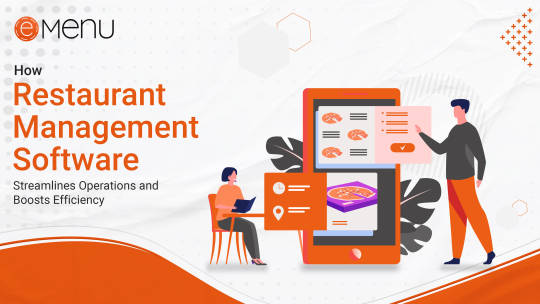
The restaurant industry is highly competitive, and efficient operations play a crucial role in the success of any establishment. In today's digital age, restaurant management software has emerged as a powerful tool to streamline operations and boost efficiency. This blog post explores the various ways in which restaurant management software revolutionizes the way restaurants operate, enabling them to deliver exceptional customer experiences while optimizing their backend processes.
The Role of Restaurant Management Software:
Online eMenu Restaurant management software is a comprehensive solution designed to handle the diverse aspects of running a restaurant. It encompasses a wide range of features and functionalities that simplify day-to-day operations, enhance productivity, and improve overall efficiency. From Restaurant tasks to Restaurant operations, the software offers a centralized platform to manage and streamline various processes.
Streamlining Restaurant Operations:
In the bustling environment of a restaurant, managing Restaurant operations efficiently is essential. Online eMenu Restaurant management software offers tools for reservation and table management software, allowing customers to book tables online and providing staff with real-time updates on reservations. This helps optimize table turnover and maximize seating capacity, leading to better customer service and increased revenue. Additionally, the software integrates with the point-of-sale (POS) system, enabling seamless order taking and processing.
Enhancing Restaurant Efficiency:
Efficiency in the Restaurant operations is equally important for smooth restaurant functioning. With restaurant management software, staff scheduling and labor management become hassle-free. The software automates scheduling, taking into account factors such as staff availability and workload, resulting in optimized staff allocation and improved productivity. It also tracks labor costs and performance metrics, providing valuable insights for effective decision-making.
Supplier and procurement management is another critical aspect that software addresses. By streamlining the ordering process and managing suppliers, restaurants can ensure timely and accurate deliveries. The software facilitates inventory forecasting, minimizing wastage and optimizing stock levels. Real-time reporting and analytics capabilities empower restaurant owners and managers to monitor sales, expenses, and performance, enabling data-driven decision-making.
Customer Relationship Management (CRM):
Building strong customer relationships is vital for the success of any restaurant. Restaurant management software Customer Relationship Management (CRM) helps in creating and maintaining customer profiles, capturing preferences, and analyzing data to deliver personalized experiences. Additionally, the software facilitates the implementation of loyalty programs and targeted marketing campaigns, allowing restaurants to engage with customers effectively and increase customer retention.
Ensuring Data Security and Accessibility:
Data security is a paramount concern in today's digital landscape. Restaurant management software offers robust security measures to protect sensitive customer information and business data. Cloud-based solutions provide data backup and ensure accessibility from anywhere, anytime, allowing owners and managers to monitor and manage their restaurant's operations remotely. User access control features further enhance data privacy and confidentiality.
Case Studies: Success Stories of Restaurant Management Software Implementation
Real-life examples of restaurants that have implemented restaurant management software can provide valuable insights into its effectiveness. Case studies highlighting specific improvements and outcomes achieved through the software demonstrate how it has helped restaurants streamline their operations, enhance efficiency, and deliver exceptional dining experiences.
Challenges and Considerations:
While restaurant management software offers numerous benefits, it's essential to consider potential challenges and factors when selecting the right software. Factors such as cost, scalability, user-friendliness, and integration capabilities with existing systems should be evaluated before making a decision. Addressing these considerations ensures a successful implementation and maximizes the software's potential.
Conclusion:
Restaurant Management software has become a game-changer in the industry, revolutionizing the way restaurants operate. By streamlining operations, enhancing efficiency, and optimizing processes, this software empowers restaurants to deliver exceptional customer experiences while driving profitability. As technology continues to shape the future of the restaurant industry, embracing restaurant management software becomes essential for those seeking.
#restaurant management software#contactless menu system#qr code#restaurant management system#restaurant pos system#contactless menu#contactless qr code menu#contactless ordering app#point-of-sale (POS) system#point-of-sale system#pos billing software#restaurant pos software#pos system#pos software#restaurant software#restaurant sales#restaurant#qrcodemenu#qr code menu#cloud based pos billing system#cloud based pos billing software#crm software#crmintegration#restaurant crm#restaurant crm software#crm development#online food ordering software#online food ordering system#food ordering system online#Restaurant Table Booking
4 notes
·
View notes
Text
Streamlining Your Operations: How Software Solutions Can Boost Business Efficiency

Improving efficiency is crucial for companies to stay competitive and achieve success. One way businesses can enhance their efficiency is by leveraging software solutions. Specifically, project management software, accounting and financial management software, customer relationship management (CRM) software, and human resources management (HRM) software are instrumental in streamlining operations. In this blog post, we will explore how these software solutions can help businesses improve their efficiency and drive success.
Project Management Software:
Efficient project management is crucial for completing tasks on time and within budget. Project management software offers a centralized platform for planning, scheduling, and collaboration. It allows businesses to break down projects into tasks, assign responsibilities, and track progress in real-time. By providing visibility into project timelines and resource allocation, businesses can optimize workflows, identify bottlenecks, and allocate resources effectively. Moreover, features like task dependencies, document sharing, and automated notifications enhance communication and collaboration, minimizing delays and ensuring smooth project execution.
Accounting and Financial Management Software:
Financial management is the backbone of any business. Accounting and financial management software streamline financial processes, such as invoicing, expense tracking, and budgeting. Automating these tasks minimizes human error, saves time, and improves accuracy. Additionally, these software solutions provide real-time insights into financial data, enabling businesses to make informed decisions promptly. With features like automated report generation, tax compliance, and integration with banking systems, businesses can optimize financial operations, reduce costs, and improve cash flow management.
Customer Relationship Management (CRM) Software:
Customers are the lifeblood of any business, making CRM software essential for efficient customer management. CRM software consolidates customer data, interactions, and communication history in a centralized database. This enables businesses to gain a comprehensive view of their customers, personalize interactions, and provide better customer service. By automating lead management, sales tracking, and customer support processes, businesses can streamline their operations, enhance customer satisfaction, and increase sales. Moreover, CRM software offers analytical tools to identify customer trends, preferences, and behavior, enabling businesses to tailor their strategies accordingly.
Human Resources Management (HRM) Software:
Efficiently managing human resources is crucial for organizational success. HRM software simplifies and automates various HR processes, including recruitment, employee onboarding, payroll, and performance management. By centralizing employee data, businesses can streamline administrative tasks, reduce paperwork, and enhance data accuracy. Additionally, HRM software offers self-service portals for employees, empowering them to access and update their information, request time off, and participate in performance evaluations. These features improve employee satisfaction, increase productivity, and enable HR teams to focus on strategic initiatives.
Leveraging software solutions is essential for businesses aiming to streamline their operations and boost efficiency. Project management software optimizes project execution, accounting and financial management software enhances financial processes, CRM software improves customer management, and HRM software streamlines HR operations. By adopting these software solutions, businesses can automate repetitive tasks, improve collaboration, gain real-time insights, and allocate resources effectively. Embracing software solutions not only saves time and reduces costs but also empowers businesses to focus on innovation and growth, ultimately driving long-term success.
2 notes
·
View notes
Text
5 Reasons to Build a Custom CRM
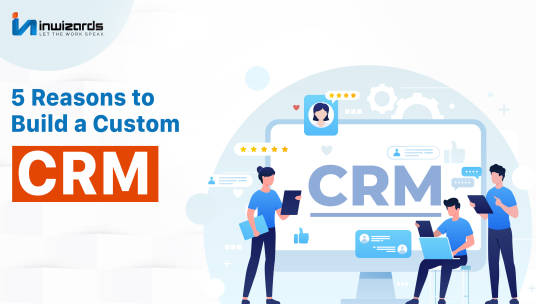
A CRM system is an essential tool for businesses to manage customer interactions effectively. There are numerous CRM software options available in the market.
In this article, we’ll delve into five reasons why it’s wise to invest in building a custom CRM. Firstly, custom CRMs are tailored to meet specific business needs and workflows, leading to more efficient processes and increased productivity. Secondly, custom CRMs offer enhanced security measures and better data privacy protection. Thirdly, a custom CRM can integrate seamlessly with your existing systems, providing a unified view of customer data.
Finally, building a custom CRM can be more cost-effective in the long run, as businesses can avoid ongoing licensing fees and expensive customization costs associated with off-the-shelf software.
Unique Functionalities
One of the primary benefits of creating a custom CRM system is the ability to add unique functionalities that are customized for your business. Pre-built CRM software may not provide the flexibility required to tailor your customer interactions and user experience. With a custom CRM, you can add personalized dashboards, customized reports, and workflows that match your business processes.
This can significantly improve productivity and efficiency, as well as provide a competitive advantage over businesses that use generic CRM solutions.
Integration with Another System
Building a customized CRM system provides an opportunity to integrate it seamlessly with other essential business systems. Pre-packaged CRM solutions may not offer the required level of integration, which can lead to disconnected data silos and inefficient processes. A bespoke CRM solution can be designed to work in tandem with other critical systems, such as ERP, accounting, and marketing automation software.
This creates a unified view of customer data, streamlines operations, and eliminates manual data entry errors. Customized integrations also help automate repetitive tasks, freeing up valuable employee time.
Security Data
One of the most significant advantages of creating a custom CRM system is the ability to implement robust security measures to protect customer data. Pre-built CRM software can have vulnerabilities that leave customer data at risk of external threats, which can compromise customer trust.
A custom-built CRM system allows businesses to design security protocols and data privacy policies that align with their specific needs. This includes implementing encryption, access control, and data backup and recovery measures.
Eases Scaling Process
Creating a custom CRM solution can help businesses ease the scaling process as they grow. As a company expands, its customer management requirements become more intricate, and out-of-the-box CRM software may not be adequate to handle the increased workload.
With a customized CRM solution businesses can tailor their CRM system to meet their evolving needs, adding features, functionalities, and integrations as required without switching to a new CRM platform entirely.
What is CRM Application Development?
CRM application development is the process of building a customized customer relationship management system for businesses. Such systems are designed to help businesses manage their customer interactions, optimize their sales and marketing processes, and improve customer retention rates. Although there are off-the-shelf CRM solutions available, a custom CRM application provides businesses with a bespoke solution that caters to their unique needs.
The development process for a custom CRM application typically involves several stages. Firstly, a comprehensive analysis is conducted to understand the specific challenges and opportunities that the CRM system needs to address. This includes an evaluation of the current processes, data structures, and integrations that are in place.
Next, the development team creates a customized solution that addresses the identified challenges and opportunities. This may involve the creation of new features, the integration of existing software and systems, and the implementation of tailored security and privacy measures.
The coding and testing phases follow the design phase, with the development team creating the software and testing it thoroughly to ensure that it meets the business’s requirements and functions correctly.
Conclusion
Creating a customized CRM solution provides businesses with a wide range of benefits that cannot be found in off-the-shelf CRM software. A tailored CRM application offers unique features and functionalities that address a business’s specific needs, enhancing the effectiveness and efficiency of its sales and marketing processes.
Moreover, Custom CRM Applications can be seamlessly integrated with existing software and systems, streamlining operations and saving time and resources. Additionally, custom CRM systems offer advanced security features that protect customer data, reducing the risk of data breaches and ensuring compliance with data protection regulations.
#crm software#crm development#crm solutions#crm software development company#CRM Software Development Service#crm implementation#crmintegration#CRM#crm development company#web development company#web development services
2 notes
·
View notes
Text
6 Steps to Implement CRM Process for Businesses

In today's digital age, customers have become demanding and expect better and more personalized shopping experiences. To meet these demands, businesses need to understand what their customers want and need and provide them with better services and shopping experiences than their competitors. This is why customer relationship management (CRM) software has become an important tool for businesses. CRM helps organizations automate their work processes and intelligently store customer data.
What can CRM do for businesses?
CRM software (Customer Relationship Management) is a customer relationship management tool for businesses. It helps automatically store customer data, and classify customers by source, interested products, and purchasing activity. This system has the ability to automatically record the interaction history between employees and customers, ensuring complete care for all customers, avoiding omissions and assigning roles, and managing employee activities to help administrators easily control work efficiency and evaluate sales performance.
In addition, CRM software also integrates features such as connectivity, call support, email marketing, and automatic SMS, helping to automate customer care processes and support. It also helps manage customer profiles and group customer segments to constantly update the information and activities of each customer. The CRM system also allows for customer service management and marketing automation, helping to screen customer targets and evaluate the effectiveness of marketing campaigns.
6 steps to implement the CRM process
The process of implementing CRM (Customer Relationship Management) for businesses usually includes the following steps:
Step 1: Analyze needs and set goals
Analyzing needs and setting goals is an important first step in implementing a CRM system. Before starting the implementation, the business needs to carefully analyze its needs to determine the most important priorities. After analyzing the business needs, set goals for implementing the CRM system. These goals should be based on the most important priorities of the business. Analyzing needs and setting goals is an important step to help businesses make accurate decisions about implementation and ensure that it meets their goals.
Step 2: Select a CRM system
To select a CRM system that is suitable for the goals and needs of the business, it is necessary to clearly define the features and functions.
Step 3: Prepare data
Preparing data is the next step in implementing a CRM system. This step involves collecting, cleaning, and organizing customer data to ensure that it is accurate and consistent.
Step 4: Train employees
Training employees on how to use the CRM system is an important step in successful implementation. Employees need to understand how to use the system to optimize its benefits.

Step 5: Test the system
Before implementing the CRM system, it is important to test it to ensure that it meets the needs and goals of the business.
Step 6: Launch and evaluate
After testing the system, launch it and continuously evaluate its performance to ensure that it is meeting the goals of the business. This evaluation process should be ongoing to identify areas for improvement and ensure that the system continues to meet the needs of the business.
Summary
In order to connect and provide the best values and experiences for customers, CRM is an essential solution. A business that wants to develop its operations cannot be without a tool to manage customer relationships. These are the 6 steps to implement a CRM process for your business that you may need to know.
Pricing levels for CRM software implementation:
How much does CRM software cost in Vietnam?
------------------------------------------------------------------------------
6 bước triển khai quy trình CRM cho doanh nghiệp

Trong thời đại số hóa ngày nay, khách hàng đã trở nên khó tính và mong muốn nhận được trải nghiệm mua hàng tốt hơn và cá nhân hóa hơn. Để đáp ứng được những yêu cầu này, các doanh nghiệp cần phải hiểu rõ khách hàng của mình muốn gì và cần gì, và cung cấp cho họ các dịch vụ và trải nghiệm mua hàng tốt hơn đối thủ cạnh tranh.
Đó chính là lý do tại sao phần mềm quản lý quan hệ khách hàng (CRM) trở thành một công cụ quan trọng đối với các doanh nghiệp. CRM giúp các tổ chức tự động hoá quy trình làm việc và lưu trữ dữ liệu của khách hàng một cách thông minh.
CRM có thể giúp gì cho doanh nghiệp
Phần mềm CRM (Customer Relationship Management) là công cụ quản lý quan hệ khách hàng cho doanh nghiệp. Nó giúp lưu trữ tự động dữ liệu của khách hàng, phân loại khách hàng theo nguồn đến, sản phẩm quan tâm, hoạt động mua hàng. Hệ thống này có khả n��ng tự động lưu lịch sử tương tác của nhân viên với khách hàng, giúp đảm bảo chăm sóc đầy đủ cho tất cả các khách hàng, tránh bỏ sót và phân quyền, quản lý hoạt động nhân viên giúp nhà quản trị kiểm soát dễ dàng hiệu quả làm việc và đánh giá được hiệu quả bán hàng.
Ngoài ra, phần mềm CRM còn tích hợp các tính năng kết nối, hỗ trợ gọi điện, gửi email marketing, SMS tự động, giúp tự động hóa quy trình chăm sóc, hỗ trợ khách hàng. Nó cũng giúp quản lý hồ sơ khách hàng và phân nhóm đối tượng khách hàng để liên tục cập nhật thông tin, hoạt động của từng khách hàng. Hệ thống CRM còn cho phép quản lý dịch vụ khách hàng và tự động hóa tiếp thị, giúp sàng lọc đối tượng khách hàng và đánh giá hiệu quả của các chiến dịch marketing.
6 bước triển khai quy trình CRM
Quy trình triển khai CRM (Customer Relationship Management) cho doanh nghiệp thường bao gồm các bước sau đây:
Phân tích nhu cầu và đặt mục tiêu
Phân tích nhu cầu và đặt mục tiêu là bước đầu tiên quan trọng trong việc triển khai hệ thống CRM. Trước khi bắt đầu triển khai, doanh nghiệp cần phân tích cẩn thận các nhu cầu và mục tiêu của mình để xác định được các ưu tiên quan trọng nhất. Sau khi phân tích các nhu cầu của doanh nghiệp, cần đặt mục tiêu cho việc triển khai hệ thống CRM. Các mục tiêu này nên được xác định dựa trên những ưu tiên quan trọng nhất của doanh nghiệp. Việc phân tích nhu cầu và đặt mục tiêu là một bước quan trọng để giúp doanh nghiệp đưa ra quyết định chính xác về việc triển khai và đảm bảo rằng nó đáp ứng được các mục tiêu của doanh nghiệp.
Lựa chọn hệ thống CRM
Để chọn được một hệ thống CRM phù hợp với mục tiêu và nhu cầu của doanh nghiệp, cần phải xác định rõ những tính năng và chức năng.
Một số tính năng và chức năng cần thiết của hệ thống CRM có thể bao gồm:
Quản lý thông tin khách hàng
Quản lý bán hàng
Tích hợp email marketing
Tích hợp social media
Quản lý dịch vụ khách hàng
Báo cáo và phân tích
Đào tạo và triển khai
Đào tạo nhân viên về cách sử dụng hệ thống là một công việc quan trọng để đảm bảo hiệu quả trong triển khai này trên toàn bộ doanh nghiệp.
Đầu tiên, cần xác định nhu cầu đào tạo của từng bộ phận trong doanh nghiệp, bao gồm các nhân viên bán hàng, dịch vụ khách hàng, marketing, quản lý và các bộ phận khác. Cần đánh giá cấp độ hiểu biết của từng nhân viên về hệ thống CRM để xác định mức độ đào tạo cần thiết. Sau khi đánh giá nhu cầu đào tạo, cần xây dựng kế hoạch đào tạo bao gồm thời gian, địa điểm và nội dung đào tạo. Kế hoạch cần phù hợp với lịch làm việc của từng bộ phận và tối ưu hóa hiệu quả đào tạo.
Cần chọn đội ngũ đào tạo có chuyên môn và kinh nghiệm trong lĩnh vực CRM để đảm bảo chất lượng đào tạo.
Sau khi đào tạo đã hoàn thành, cần đánh giá hiệu quả đào tạo bằng cách kiểm tra kiến thức và kỹ năng của các nhân viên và đánh giá kết quả thực tiễn. Nếu cần, cần tiếp tục đào tạo để nâng cao hiệu quả sử dụng hệ thống
Thiết lập dữ liệu
Việc thiết lập các thông tin khách hàng cần thiết trong CRM là một bước quan trọng để đảm bảo rằng doanh nghiệp có thể quản lý thông tin khách hàng một cách hiệu quả và tối ưu hóa hoạt động của mình.
Tối ưu hoá hệ thống
Theo dõi và đánh giá hoạt động của hệ thống CRM, tối ưu hoá các chức năng và tính năng để đáp ứng được nhu cầu kinh doanh và đem lại hiệu quả tốt nhất.
Điều chỉnh và cập nhật
Điều chỉnh và cập nhật hệ thống để đáp ứng được các thay đổi trong doanh nghiệp và thị trường. Việc này giúp cho doanh nghiệp có thể tăng khả năng cạnh tranh và duy trì tồn tại trên thị trường.
Lời kết
Để có thể kết nối và mang lại những giá trị, trải nghiệm tốt nhất cho khách hàng. CRM là một giải pháp thiết yếu. Một doanh nghiệp muốn phát triển kinh doanh thì không thể thiếu một công cụ quản lý mối quan hệ với khách hàng. Đây là 6 bước triển khai quy trình CRM cho doanh nghiệp mà bạn có thể cần biết.
Các mức giá triển khai phần mềm CRM:
Chi phí cho phần mềm CRM Việt Nam là bao nhiêu?
2 notes
·
View notes
Text
What is ERP Software and How it helps in the Manufacturing Industry?
What is ERP Software?
ERP (Enterprise Resource Planning) software is a type of software used by businesses to manage and integrate core business processes such as finance, HR, procurement, supply chain, and customer relationship management. The goal of ERP is to provide a single unified view of data across an organization to help streamline and optimize operations.
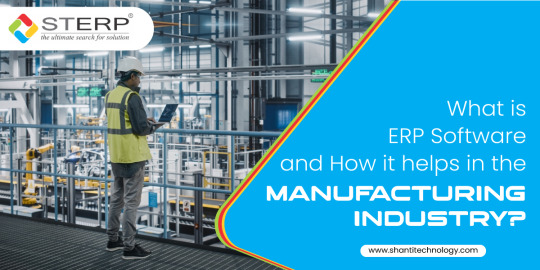
Shanti Technology is one of the most popular ERP software companies in Surat. Solutions offered by Shanti technology are one-of-a-kind and specially designed ERP software for engineering companies that follow the fashion in which people work today. It focuses on strategic IT Initiatives. These solutions maximize the availability of the systems or processes and reduce the risks as well.
Why is ERP Software used in Manufacturing Industries?
As a language model AI, I don't have personal experience but here's why:
Improved Visibility: Manufacturing industries can access real-time data from across their operations with the help of ERP software, leading to improved visibility and control over the entire production process.
Increased Efficiency: ERP software streamlines and automates many of the manual tasks involved in production, reducing the time and effort required to complete these tasks. This results in increased efficiency and improved productivity.
Enhanced Inventory Management: ERP software enables manufacturers to track inventory levels in real-time, ensuring that they have the materials they need to keep their operations running smoothly.
Better Planning and Scheduling: ERP software helps manufacturers to plan and schedule production runs more effectively, reducing the risk of bottlenecks and downtime.
Improved Cost Control: By providing a comprehensive view of all costs associated with production, ERP software enables manufacturers to identify areas where they can reduce costs and improve their bottom line.
Better Collaboration: ERP software enables different departments within a manufacturing company to work together more effectively, improving communication and collaboration throughout the organization.
Integration with Other Systems: ERP software can be integrated with other systems, such as CRM, accounting software, and supply chain management systems, providing manufacturers with a single source of truth and a more streamlined process.
Shanti Technology is one of the most popular ERP software companies in Surat. Solutions offered by Shanti technology are one-of-a-kind and specially designed ERP software for engineering companies that follow the fashion in which people work today. It focuses on strategic IT Initiatives. These solutions maximize the availability of the systems or processes and reduce the risks as well.
Benefits of ERP software for Manufacturing Industries
Increased efficiency: ERP software streamlines processes, reducing manual work and speeding up production times.
Improved data management: Manufacturing industries often collect and manage a lot of data. ERP software allows for more accurate, organized, and accessible data storage and analysis.
Better inventory management: ERP software tracks inventory levels, automates reordering, and helps ensure production schedules aren’t impacted by stock shortages.
Enhanced collaboration: ERP software integrates data across departments, allowing for better communication and collaboration between teams.
Increased accuracy: ERP software minimizes human error, allowing for a more accurate record of information, such as production data and inventory levels.
Better decision-making: ERP software provides real-time data and analytics that support informed decision-making for production, purchasing, and sales.
Better supply chain management: ERP software provides visibility into the entire supply chain, allowing for better tracking, communication, and coordination between suppliers and production teams.
Reduced costs: By streamlining processes and reducing manual work, ERP software can reduce costs associated with production, inventory management, and supply chain management.
Shanti Technology is one of the most popular ERP software companies in Surat. Solutions offered by Shanti technology are one-of-a-kind and specially designed ERP software for engineering companies that follow the fashion in which people work today. It focuses on strategic IT Initiatives. These solutions maximize the availability of the systems or processes and reduce the risks as well.
ERP software represents the next generation in business software. While basic, functional ERPs have been around since the 1980s, these systems are now evolving to meet the needs of modern businesses. The best ERP systems today allow businesses to leverage information and process data in real-time rather than waiting for periodic reporting periods; they also enable a unified view of business data to promote clear decision-making processes, and they are cloud-based, allowing companies to save money on expensive hardware upgrades.
Shanti Technology is one of the most popular ERP software companies in Surat. Solutions offered by Shanti technology are one-of-a-kind and specially designed ERP software for engineering companies that follow the fashion in which people work today. It focuses on strategic IT Initiatives. These solutions maximize the availability of the systems or processes and reduce the risks as well.
#ERP software Companies in India#ERP software for engineering company#ERP software Companies in Surat#ERP Software Companies in Mumbai | Pune | Bhopal | Surat | Rajkot - STERP
7 notes
·
View notes
Text
The must have ecommerce integrations for your business
World has started moving away from the lockdown phase. The pandemic has done no good to anyone except for the ecommerce industry. With the increased demand for contactless payments, people have started buying things online now more than ever. This is the right time for etailers to grab opportunities for growth and start selling products online in all the available digital channels. While planning for perfection is under continuous debate in an ecommerce world, online sellers still need different ecommerce integrations to run their business.
As an ecommerce seller, you must have known how daunting it is to manage orders on different storefronts and marketplaces tied up with various courier partners, accounting systems, and so on. This is where ecommerce integrations step in to integrate your business with utilized CRMs, Marketplaces, shipping and fulfillment, warehousing, etc.. By automating the key functions of your business, these integrations can help you squarely focus on your business growth rather than just managing all the platforms.
Read on to learn the best integrations for your business and their impact on business efficiency.
Shipping and Fulfillment Integrations
Ecommerce fulfillment is the process of sending orders to your customers. It involves the entire product delivery cycle once the products enter a warehouse, from storing them to picking, packing, and then shipping them to your customers. A renowned fulfillment partner can help you successfully handle all business fluctuations based on your purchase of storage and security equipment, insurance, and more. With the fulfillment partners handling your complex order processing, you, as an ecommerce seller, can focus on what's more important for your business.
CRM Integrations
A CRM is a customer relationship management software that helps any business to monitor, measure and analyze its relationship with its customers. It helps you understand customer behavior across various digital channels by auto-capturing the data from all the lead engines and thus also helping a company to get into marketing automation based on customer interaction and expectations. Thus, a CRM ecommerce integration for your ecommerce business will help you offer better customer service, increased sales, improved customer retention, detailed analytics, efficiency, and so on.
Accounting Integrations
Every ecommerce business would need accounting e-commerce integrations that can help them with payroll, bookkeeping, purchase-and-sales charts, budgeting, profit-and-loss charts, cash flow statements, and so on. Dealing with bulk invoices, profit loss, unclear tax laws, payroll, and several financial aspects. The benefits of accounting automation in ecommerce also extend to appropriate resource allocation and understanding income statements, cash flow statements, and balance sheets.
Marketplace Integrations
If you are getting orders from multiple marketplaces, it's a sure sign of growth for your business. Having said that, this also welcomes an increased challenge of bulk data upload, invoices, product labeling, updating inventory, and so on with numerous orders that you receive from numerous marketplaces. Thus, getting an ecommerce solution that offers multiple marketplace ecommerce integrations for your business is important. This can reduce the manual selling process, boost inventory visibility, and ultimately offer a unified view of your orders under one dashboard.
POS Integrations
If you are an omnichannel seller, POS integration is a must for your business as it helps you easily handle all your online and offline orders and transactions. Not just this, a POS ecommerce integration also helps you to get rid of manually inputting the data, enabling the creation of promotions across multiple channels, enhancing the customer experience, etc..
To Summarize:
Marketplace ecommerce integrations can help you give you a unified view of offline and online sales channels under one dashboard. With real-time updates on your order distribution across multiple channels, you will now be able to concentrate on more critical components of your business.
2 notes
·
View notes
Link
SalezRobot’s CRM is a World's Best Customer Relationship Management Software manage all your Leads, Marketing, Sales and Support automation for all your business success
0 notes
Text
CRM Development Company
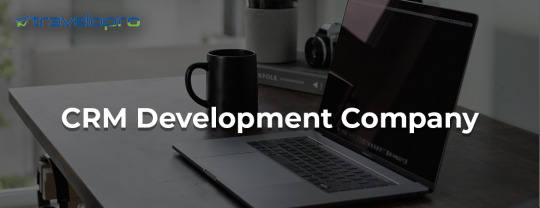
What is Customer Relationship Management (CRM)?
Customer Relationship Management (CRM) allows your business to monitor, track and analyze your customer behavior and help you provide them with the best of your services.
Travelopro comes as one of the premium open sources CRM software that offers a holistic suite of business management software tools including CRM. It has proven to be a successful source for CRM software development for years.
Get the fastest connectivity, real-time access, multiple networking, and data analysis which lets you better your services at ease.
CRM Development Company
Travelopro is an industry-leading CRM development company, providing highly customized CRM solutions with rich functionality to a wide variety of industries. We help enterprises build and implement top-class CRM solutions that allow them to efficiently organize, and manage customer relationships and enhance profitability.
Travelopro is one of the best Custom CRM Software Development Company. We deliver the best CRM software development Solutions around the world. Nurture your business with our customized CRM Software Development Services.
With Travelopro's SaaS and cloud-based functionality, you can avail of some of the best CRM software development services for your business. You can utilize this CRM software development for all the requirements covering financial management, Accounting, Billing, Project management, and much more.
We have a highly competent team of developers that will understand your business requirements and accordingly create a scalable and user- friendly customer relationship management (CRM) system. Become our partner and take your CRM process to the next level and feel the difference.
How Custom CRM software fits your business needs?
The CRM system is a software tool that conforms to your unique needs in customer management, business operations control, and maintaining a solid return on investment (ROI).
A customized CRM system connects all data sources together to ultimately address customer expectations together with a focus on analytical insights when closing deals and estimating revenue growth.
Travelopro is a custom CRM development company committed to your privacy and your data's top security, so we provide highly reliable solutions you can trust. We develop CRM software applications that organize entire volumes of data within a company and then translate them into profitable interactions.
Our clients experience additional productivity optimization and efficiency benefits through custom CRM software solutions when paired with advanced real-time analytics and mobile capabilities.
Travelopro CRM solutions support your business growth with:
Lightweight custom solutions according to each client's needs
Surpassed functionality and scalability for improved workflow
Optimized efficiency that our clients fully appreciate
We build cutting-edge, feature-rich, and tailored CRM solutions for a smooth business process
If you desire to create stronger connections with your customers, then a custom CRM is what you need! Whether marketing, sales, or getting invoices, Travelopro's custom CRM development services will accord you with everything that you need to have while conversing with your customers.
Travelopro, being a top custom CRM development company, enables businesses to streamline productivity by optimizing sales cycles. At Travelopro, we design and develop custom CRM apps, tailored specifically to meet your needs.
With vast experience at hand, as a CRM development company, Travelopro offers comprehensive end-to-end solutions to a wide range of CRM solutions right from pre-sales to post-sales activities, management of the resources, products, and services of an organization ranging from a small to an enterprise level.
If you are trying to build a set of customers or already possess thousands of contacts, a tailored CRM solution will help you to analyze and organize your customers' data to scale your business to newer heights.
Our expertise in creating fully customized CRM development solutions over the years helped us to have a better understanding of the business logic and processes. Our well-versed team of CRM developers accords your solutions with all the peculiarities of your business.
Our wide array of CRM development services offers industry-leading CRM mobile app development that works exclusively for your target segments. We define the CRM software development requirements after detailed research about your business processes and workflows.
Satiating the requisites by reducing the operational cost and increasing the turnaround time of an organization by custom CRM development is the sole aim of our talented team at Travelopro.
We will help you create valuable customer relationships with CRM software solutions personalized based on your requirements. Our CRM software solutions help you integrate cutting-edge solutions in your daily business transactions that help you save time and cut expenditure while gaining and retaining more potential customers.
With Travelopro, you are able to opt for the CRM software solutions that help integrate multiple customer touchpoints that add up building loyalty to get higher satisfaction and long-term business partnerships as outcomes.
With us, you are able to adopt a practical data-driven CRM software solution that makes way for the intelligent reporting and analytics that help taking information-backed decisions. Obtain a contemporary approach for customer management as it is important to build a better future while improving business opportunities along.
Travelopro is a reliable developer of custom ERP solutions such as CRM systems. We have significant experience in building and integrating automated CRM software. We work with various industry verticals and domains.
At Travelopro, we have a team of well-experienced CRM developers whom you can expect to design CMS adaptable for small businesses and also for large corporations. Making the most out of the best available customer-facing resources that aid planning, deploying targeted sales, and developing marketing activities are the main solutions while seeking CRM success.
We have a team of professionals who will help you make business expansion with lucrative customer service and relationship administration in the course of roping in CRM Development Company with the new IT ambiance. You will be able to go for a highly strategic imperative option that helps to serve as a practical option extending the automation.
Why Travelopro for your CRM Development?
We use years of experience and expertise to offer custom CRM development services to meet your business standards and generate heavy revenue. At Travelopro, we value your business like ours and ensure that you are a part of the development cycle.
Cost-Effective
We are a reputed CRM development company that has helped several businesses find smart ways to track and nurture contacts with an existing and prospective client without much effort. You can bank on us for all the functionality required to manage information and relationships across multifarious touchpoints within the budget.
Highly Reliable
We are your reliable partner in your quest for the best CRM software solutions. Our team is trained to offer complete reliability in terms of data generation and security for your business.
On-Time Delivery
Customers are our top-most priority and when we commit to a particular timeline, we deliver with utmost sincerity. Alongside we ensure to deliver products of high quality.
The Main Benefits of a Custom CRM Software Development
Saved Time and Increased Productivity
Enhanced customer interaction and streamlined business processes.
Efficient Customer Information Management
Better communication with clients thanks to centralized documentation, data visualization, and reporting.
Automated Business and Sales Processes
Automated lead generation, reporting, and client interaction processes.
Enhanced Lead Generation Management
Optimized and automated process of lead generation with a reliable system of analyzing and communicating with potential clients.
Reports and Deep Analysis
Improved customer interaction and conversions thanks to the various tools and plugins of custom CRM solutions.
High Data Security
With a centralized CRM system, only authorized employees can get access to business data and customer details.
Customized CRM Software Development Solutions
Being a most trusted CRM Software Development Company. Travelopro offers you a well customized and highly optimal CRM Software Development Solution as per your business requirement. Increase efficiency with improved results to boost your business.
With Travelopro, try developing cost-effective and customized CRM software that helps to minimize resources while spending and amplifying impactful results from customer satisfaction and multiple tasks.
CRM Portal Development
We offer a stepwise approach for CRM portal development that aids in enhancing productivity and reduces portal costs with a highly usable CRM extension based on the dynamics or other available tools.
CRM Mobile Apps
You can control your CRM software solutions wherever you go with its latest apps. Get on-time dashboards with intuitive information to support better decision-making and quick operational ramifications as these helps drive higher customer satisfaction.
CRM Development Solutions
Travelopro's CRM development solutions are easily implantable within weeks instead of months. Integrate our customer solutions for CRM with your existing solutions, which are easy to learn and certainly adaptable. We offer modifications for your existing CRM software and with evolved requirements to make that future-proof.
CRM Software Integration
This software is interconnected and allows connecting the missing dots within and outside of the dedicated departments with integration. You can share multiple details including customer contact, SLA, bills, and other variables via a single portal having a dynamic customer information center for easier management and maintenance.
CRM Consultancy
Being one of the CRM development companies, we emphasize consulting small and large businesses to drive multi-departmental growth. With our Travelopro's CRM consultants, you can take your business towards leveraging the existing technologies and customizing the CRM solutions according to your requirements.
CRM Personalization
You will be able to make the most out of the multiple CRM tools by conducting CRM personalization at every stage. Drive metrics that matter for your organization while you can go for the custom CRM software development based on the available resources to help to remain a step ahead of your market competitors.
CRM Migration Solutions
We ensure zero information loss and guarantee utmost data integration as our foremost priority. We offer CRM software services that support end- to-end, efficient CRM migration solutions that help to initiate a high-level brief and forecast possible information gaps in order to keep the process de-cluttered.
CRM Execution
We execute CRM software solutions effortlessly for your business with a proven strategy that helps data migration and rolling out each of the modules phase-wise. We have a dedicated CRM implementation team who are assigned strategic and executive roles to execute the entire process effortlessly.
CRM Software Support & Maintenance
We offer 24/7 and 365 support and maintenance with our professional CRM software developers. Our professionals will provide on-time maintenance and updates which are necessary for smooth functioning.
For more details, Pls visit our Website:
0 notes